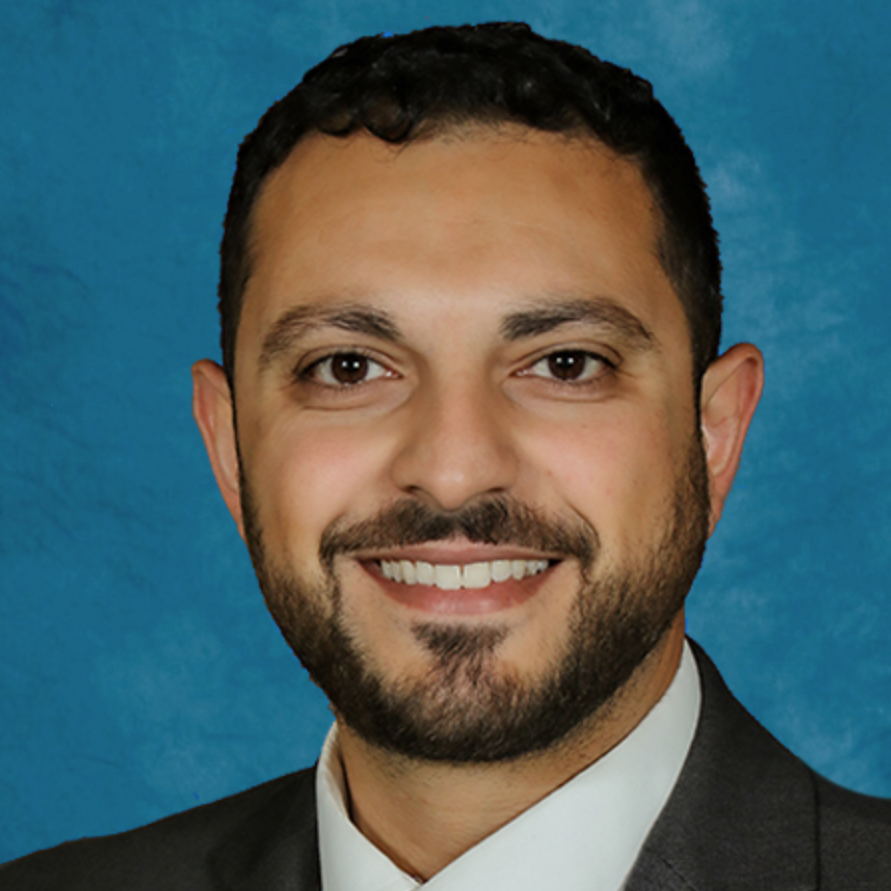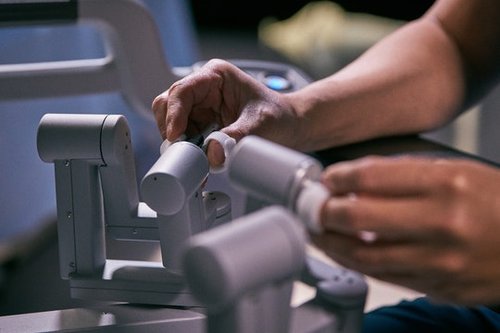

Mina Saeed
Surgeon
800 Austin St East Tower, Ste. 563 Evanston IL, 60202About
Dr. Mina Saeed is a board certified, and fellowship trained bariatric and general surgeon, practicing in Evanston, IL. He is currently accepting new bariatric and general surgery patients, at AMITA-St. Francis Hospital. Dr. Saeed specializes in minimally invasive surgery, such as robotic surgery, and other advanced laparoscopic and endoscopic techniques.
His passion is weight-loss surgery. As a bariatric patient himself, he intimately understands the broad impact obesity has on the quality of one's life. Through his success with bariatric surgery, he is driven to help others achieve their health and weight-loss goals.
To make an appointment, please visit www.surg-associates.com or call 847-869-0522. For direct questions, you can reach out to him through the "Patient Questions" portal. Facebook and Instragram sites are currently under development.
Mina Saeed's Videos
Education and Training
Rush Medical College MD 2013
Board Certification
American Board of Surgery
Provider Details

Mina Saeed's Expert Contributions
Can you live a normal life after a colectomy?
Hello, excellent question. It depends on the amount of colon removed, and how you are reconstructed. Removing up to 1/3 of the colon likely won't cause a noticeable change in your life, other than perhaps moving your bowels more frequently. Removing 3/4 or more of your colon will certainly lead to the increasing frequency of bowel movements, and may also result in looser stools, as the colon is unable to absorb water from the waste. READ MORE
Is local anesthesia safe for diabetics
Absolutely. READ MORE
Are you awake during inguinal hernia surgery?
You can choose to be awake during inguinal hernia repair if you would like to avoid general anesthesia. Most cases are done under anesthesia. READ MORE
Appendix moved itself - scans confirmed?
Even though there are plenty of articles to suggest it can be treated with antibiotics, what they fail to mention is it takes patients a lot longer to return to a normal life, and the infection can return. My personal recommendation is if you were diagnosed with appendicitis, have it removed. It's a non-essential organ, and you won't even know it's missing. READ MORE
Exercise after a c-section?
Yes, in general, it is safe to start strenuous exercise 6-8 weeks after abdominal surgery. Congratulations! READ MORE
Abdominal pain?
Hello, Is the pain brought on by food? Do you have nausea? Any symptoms of heartburn, acid reflux, bloating, or indigestion? READ MORE
Hiatal hernia?
Hello, yes, there are great treatments available for hiatal hernia. The most commonly performed procedure, is hiatal hernia repair, with some type of fundoplication, to recreate the lower esophageal "sphincter". The most common is called a Nissen fundoplication. Other options include Linx, which is like a magnetic bracelet that goes around the top of the stomach and tightens the junction to prevent acid from refluxing. This is not effective in the setting of a large hiatal hernia, due to the size of the defect at the diaphragmatic hiatus. A series of tests, including endoscopy, X-ray with oral contrast, esophageal manometry, and pH study is often required to inform the best treatment pathway. Please let me know if you have further questions. READ MORE
When is general anesthesia used for colonoscopy?
Typically, a colonoscopy is done under conscious sedation. This means you will be sleepy, and generally unaware of the procedure, but can be aroused with stimulus. This does not require general anesthesia. READ MORE
Which is better laparoscopy or open surgery for appendicitis?
Laparoscopy is associated with less pain, less surgical site infection, and shorter recovery time. The only time an open appendectomy is superior is when the procedure cannot safely be done laparoscopically, due to scar tissue, abnormal anatomy, bleeding, etc. READ MORE
How long will I stay in hospital after liver resection?
Hello, This all depends on the type of resection. In other words, how much of the liver is being resected, and how are they approaching it (open vs laparoscopic). The length of stay can vary between 2-5 days, depend on how you recover. READ MORE
Treatment plan for small bowel ileus?
Hello, Small bowel ileus can be secondary to many things, but is self-limiting. It can happen in the setting of illness (pneumonia, UTI), intra-abdominal infection, or post-surgery. It should resolve with bowel rest, and ambulation. If there is an abscess, it should be drained if accessible, or treated with antibiotics promptly. I hope you have a speedy recovery! READ MORE
Areas of expertise and specialization
Faculty Titles & Positions
- Medical Director-Trauma Services AMITA-St Francis Hospital 2021 - Present
- Clinical Assistant Professor of Surgery University of Illinois-Chicago 2021 - Present
Professional Memberships
- ASMBS
Fellowships
- Scripps Clinic-San Diego Advanced Minimally Invasive and Bariatric Surgery
Fellowships
- Scripps Clinic-San Diego0Advanced Minimally Invasive and Bariatric Surgery
Professional Society Memberships
- American Society for Metabolic and Bariatric Surgery, and the Society of American Gastrointestinal and Endoscopic Surgeons. He is also certified in Basic Life Support, Advanced Cardiac Life Support, and Advanced Trauma Life Support
Mina Saeed's Practice location
Mina Saeed's reviews
Write ReviewMedia Releases
Get to know Bariatric Surgeon, Dr. Mina Saeed, who serves patients in Evanston, Chicago, and surrounding suburbs in Illinois.
A board-certified and fellowship-trained bariatric surgeon, Dr. Saeed is affiliated with Surgical Associates, SC, serving as the Medical Director of Trauma Surgery at AMITA St. Francis Hospital-Evanston.
Established in the 1960s, the board-certified physicians of Surgical Associates, SC in Evanston, Illinois have built a reputation for surgical excellence. They are proud to offer patients the most comprehensive general surgical services with state-of-the-art equipment at AMITA St. Francis Hospital. Their capable physicians provide a full spectrum of operative procedures encompassing a broad array of surgical disease states.
Throughout his academic career, Dr. Saeed received his Bachelor of Science degree in Biology from the University of Wisconsin-Milwaukee, and earned his medical degree from the Rush Medical College. He then went on to complete his residency in General Surgery at the University of Illinois at Chicago-Metropolitan Group Hospitals, and his fellowship in Advanced Minimally Invasive and Bariatric Surgery at Scripps Clinic-San Diego.
Distinguished as a Fellow of the American College of Surgeons (FACS), this doctor is board-certified in bariatric surgery, trauma surgery and general surgery by the American Board of Surgery (ABS).
In order to remain up to date in his field, he is an active member of the American Society for Metabolic and Bariatric Surgery, and the Society of American Gastrointestinal and Endoscopic Surgeons. He is also certified in robotic surgery, and has completed over 50 advanced robotic procedures. Through the use of this type of minimally invasive surgery, patients are afforded shorter recovery times and hospital stays, and a quicker return to their life.
Active in academia, Dr. Saeed serves as an Assistant Clinical Professor at the University of Illinois at Chicago College of Medicine, and at the University of California-Riverside School of Medicine.
His passion for bariatric surgery stems from his own experience as a bariatric patient. Having successfully lost weight after bariatric surgery, he gained an unmatched dedication to weight-loss surgery, and obesity as a disease. As a part of a comprehensive weight-loss center, we have a registered dietician, psychologist, and medical weight-loss specialist, to help you patients along their weight-loss journey.
On a more personal note, he is fluent in both English and Arabic.
Recommended Articles
- What Conditions Warrant a Hysterectomy?
Upon reaching reproductive age, the womb (uterus) creates ideal conditions for pregnancy, gestation, and delivery of a baby. But many things can go wrong within the female reproductive system. Development of fibroid masses, outgrowths of the endometrial lining, and excessive vaginal bleeding are...
- What to Expect After a Tonsillectomy
A tonsillectomy is mostly carried out as an outpatient operation, where the patient is allowed to go home on the same day after the surgery. However, a one-day hospital stay is recommended if complications occur after the operation and if the patient has a minor or complex medical...
- Stomach Ulcers: What are the Causes, Symptoms, Diagnosis, and Treatment?
Stomach ulcers are painful lesions that are found in the lining of your stomach or small intestine. They are the most visible sign of peptic ulcer disease. Your stomach and small intestine are lined by a layer of mucus-producing cells. The mucus produced by these cells protect the lining of your...
- What are the Surgeries Used in Treating Gallstones?
Right below the liver is a small sac known as the gallbladder. Its function is to hold bile until it is required. The bile helps in the digestion/breakdown of fats. When fats are noticed by the gallbladder, it pushes the bile concentrate towards the small intestine through contractions.Bile pigment,...
- Everything You Need to Know About Gallbladder Surgery
Open gallbladder removal, also known as open cholecystectomy, is a surgical operation removing the gallbladder. The objective of the procedure is to offer permanent relief from gallbladder-related problems such as gallstones. During the surgery, a large incision is made in the abdomen and used to...
- How to Prepare for Hydrocelectomy
Hydrocelectomy refers to a surgical procedure done for the purpose of repairing or removing a hydrocele, a buildup of watery fluid around one or both testicles. This sac swells as fluid accumulates, causing discomfort but usually no pain. Since hydrocelectomy involves a sensitive part of the...
Nearest Hospitals
EVANSTON HOSPITALl
2650 RIDGE AVE EVANSTON IL 60201PRESENCE SAINT FRANCIS HOSPITALl
355 RIDGE AVE EVANSTON IL 60202







